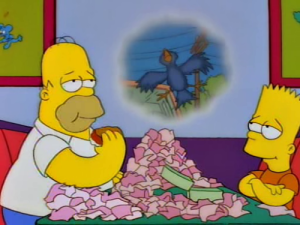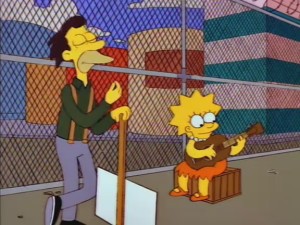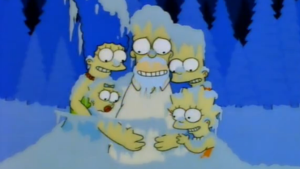“Television: Teacher, mother, secret lover!” – Homer Simpson, “Treehouse of Horror V”
There are about fifteen reasons it feels impossible for me to write about The Simpsons in any objective, cohesive manner. It’s the greatest TV show of all time, and also the most formative on my life outlook. It’s responsible for some of my fondest childhood and adult memories. I can bond with friends and family simply by muttering a few words from one of its decades-old episodes.
It’s also a freaking huge and diverse monument to American comedy and culture. The only thing that really ties its nearly thirty seasons together are a few characters and voice actors. The show’s style and tone and structure and animation have evolved drastically over a quarter century, from its rough-edged early years, to its sublime glory years, to its entertaining but unambitious later years.
It also has tackled basically every possible joke and angle on television comedy. As you age, The Simpsons grows up with you. When I was a kid, I loved the wacky images, the goofy one-liners, the funny noises. Dumb but goofy bits like “Look at that blubber fly!” and “I wash myself with a rag on a stick.”
As fond as those memories were, it was in high school that I really began to appreciate that this show was something more than a trifle. Its best episodes are sharp and infinitely rewatchable, and no show has ever been more quotable. I began integrating some quotes – even just dumb asides and memorable deliveries – into my everyday lexicon, both the generally useful (“What’s to explain? He’s an idiot!”) and the rarely relevant (“The goggles do nothing!”).
It was a few years later, in college, that I fully began to appreciate that the show is not just great, but a towering achievement. My favorite jokes and moments at this point in my life were the ones that defied expectations, twisting or extending in some absurd way beyond the punchline you’d expect. I hope I’m not alone in adoring the “knifey-spoony” gag in the Australia episode or the exploding lie detector, both of which defy the obvious punchline, or the infamous rake scene, which extends a dumb gag about three times longer than you expect.
It was also my late teens and early twenties I really started to appreciate the sheer breadth of The Simpsons’ social, cultural, and political commentary. Nearly every topic you could comfortably hit in a prime-time episode – along with a few you ostensibly couldn’t – received The Simpsons’ deconstruction and parodying, often through bizarre and hilarious angles.
My wife said it best during one of the many times I’ve made her watch a classic episode of the show after she didn’t recognize some quote or reference. This time, it was “King-Size Homer,” the show’s take on public perception of fat people. She said: “Homer’s got a point, but he’s such an idiot you can’t take it seriously.”
It’s true: The Simpsons’ fantastic writing crew, especially during its endlessly brilliant and innovative peak years, knew how to tackle an issue with both intellectual honesty and irreverence. Perhaps the quintessential example of this is “Homer the Heretic,” in which Homer decides to stop going to church. The episode both portrays Homer as selfish for ignoring his family and community’s customs, while repeatedly emphasizing that he, and many of us, would probably be a lot happier without organized religion.
After college, I made the fantastic decision to rewatch the show’s first ten seasons. Though this amounts to less than half of the show’s run, it covers the period that most (including me) believe to be The Simpsons best. This reinforced to me the drastic growth the show went through.
In its early, Klasky Csupo-animated days, the show was little more than an animated sitcom about the misadventures of a middle class family. The show devoted more of its energy to stories and wryness than vicious, breakneck punchlines. From its visuals to rough scripts, the show gave off an idiosyncratic, almost punk rock aesthetic.
During these seasons, the show spent the majority of its episodes telling stories centered around Bart. Early seasons were fascinated with the contradictions and complexities of Bart’s brattiness, the weird and backwards way he transmuted the values of his parents: the nagging Marge and the oafish Homer.
Around the show’s third season, The Simpsons began an ascension. The jokes came faster and hit harder. The stories’ focus shifted to Bart’s dad, Homer, who proved an even more hilarious and reliable source of stories as an All-American idiot. If something was lost from early seasons’ amiability, it was earned back tenfold in comic scope: Jokes ranged from subtle to broad, highest-brow to lowest-, dry to slapstick, one-liners to shaggy dogs, timely to timeless, absurd to tightly-structured, crass to classy. Those fourth(-ish) through eighth(-ish) seasons are almost all master classes of comedy, tungsten-dense and razor-sharp.
It would be difficult for me to overstate how profoundly great I find The Simpsons at its best. As basically anyone with eyes, ears, and a brain can tell you – the latter half of its first decade is an unstoppable, rewatchable force. But I also want to give some love to the underrated first half of its second decade: While Homer became dumber and the stories (understandably, given how many they’d burned through) more obtuse, the show remained boundary-pushing and consistently hilarious. Watching these episodes on Sunday nights and during weekday reruns are some of my fondest TV-watching memories.
Watching the show from its inconspicuous start to its emergence as a cultural institution, a few other things stand out. One of the oft-cited strengths is the show’s huge stable of characters. Thanks to versatile voice actors, writers, and animators, the only hurdle for introducing a new character was a spark of inspiration, of which they had dozens. Characters likely conceived as one-off jokes — Disco Stu and the Cat Lady — recurred and were eventually fleshed out and given personalities.
The huge, ever-expanding, cast of iconic characters is probably the biggest reason the show has been able to tell stories for three or four times longer than even successful sitcoms. That old adage of character-based comedy writing — put an unexpected character in an unexpected situation (Lisa becomes a vegetarian! Moe acts on a soap opera! Krusty fakes his death!) and see what stories emerge –gives The Simpsons a near infinite well of plot possibilities.
That said, a few characters have emerged as more elastic and interesting than others. Among the four leads, there’s a very clear hierarchy in terms of which ones most consistently have produced compelling stories: Homer, then Lisa, then Bart, then Marge. It’s obvious why Homer works — there’s always comedy in watching an idiot stumble through something — but Lisa is, in many ways, the show’s richest character. She’s the most human and sensible main character on the show, a sort of straight woman looking to make sense of the insanity around her.
(By the way, the writers took that idea — a straight person stuck in a cartoon — to its extreme in one of the show’s all-time classics, “Homer’s Enemy,” which featured cynical, down-on-his-luck Frank Grimes try to comprehend the cartoon logic that Homer and Springfield operate in.)
As far as side characters, it’s difficult to pull out favorites because they serve such a wide variety of roles: It’s hard to top Ralph Wiggum for legendary one-liners and non-sequiturs. But for contributing actual conflict and commentary, Mr. Burns is nearly the show’s fifth lead; he’s a stand-in for anything corrupt and “big money,” making him a perfect and frequent target of the show’s satirical outings.
For a show that’s so long-running, so multitudinous, any debate over “best Simpsons episode” is ultimately a matter of personal taste… and also an embarrassment of riches. For my money, “Last Exit to Springfield” (which is, along with “Marge vs. the Monorail,” the most-cited “best ever” episode), hits the most checkmarks of any episode: beyond being insanely innovative in its joke-telling and dazzlingly animated, it also manages to get in plenty of thought-provoking barbs about union-busting and the influence of monopolies.
if I’m looking for laughs-per-minute, I might instead turn to “Cape Feare,” which features a handful of the show’s funniest-ever gags, as the show’s crown jewel. (My dad has said that Homer’s delivery of “I think he’s talking to you” is his favorite joke of all time.)
That said, it deserves repeated emphasis that you can make a case for literally dozens of episodes to be one of the show’s best. The Simpsons could do no wrong for a many-year stretch. And even after the supposed shark-jumping of “The Principal and the Pauper” — a ridiculous but funny episode that many fans point to as the moment things went sour — the show was still reliably great (if increasingly ludicrous) for a long time. Unlike, say, the horribly inconsistent HIMYM, you don’t really need to worry about separating the wheat from the chaff until midway through The Simpsons’ second decade.
Now that I’m entering a new phase in my life — I’m no longer “with it,” though “it” doesn’t scare me just yet — The Simpsons remains a stalwart favorite of mine. It’s so objectively great, filled with so much variety and volume of laughs, that there’s always going to be some episode or season I haven’t revisited for awhile.
And just as important to its enduring quality is how formative the show was to me. Many politicians and journalists lambasted The Simpsons during its early years for promoting rebelliousness and stupidity and family strife. But I found the exact opposite to be true: The Simpsons was a rallying point for my family, a common language for us to exchange and speak in, a cornerstone of our evenings and shared free time. It taught me so many different ways to think and laugh, to be skeptical and light-hearted about “important issues” big and small, to appreciate lunacy and satire as valuable commodities.
It may not be a true substitute for a “teacher, mother, secret lover,” but it’s as close as television can come.
A few other thoughts on The Simpsons:
- I have cumulatively spent many hours of my life searching for specific clips of The Simpsons online to post on Facebook or send to my brothers. Thus, I was elated to discover Frinkiac, a searchable database of every Simpsons quote ever and its accompanying screencap. Now if someone can make something similar that allows isolation of video clips, my struggle will be complete.
- One facet of The Simpsons comedy that I need to mention is its meta-humor. Back before really any other show did it, The Simpsons made commentary on itself and its medium and the way people talked about it. It was probably never better done than “The Itchy and Scratchy and Poochie Show” — an aging TV show attempting to remain relevant dissecting the idea of aging TV shows trying to remain relevant.
- Among the most beloved traditions in Simpsons history is its annual Halloween special, “Treehouse of Horror.” Now past its 27th outing, each “ToH” is an anthology of horror- or sci-fi themed shorts. I personally find them very hit-or-miss, but the best ones are among the show’s most memorable outing. (“V” is the best, and that’s one “best of” I’m not particularly willing to budge on.)
- The Simpsons has featured a more impressive guest star list than any other scripted show ever, by a decent margin. This list shows you the sheer scope of guest appearances, though I’d argue some of its entries — e.g. Phil Hartman — would be better classified as “recurring role” than “guest star.” Special shout out to “Homer at the Bat,” which boasts nine of the biggest MLB stars of the past couple decades. (It includes Roger Clemens making chicken noises.)
- I considered trying to select my favorite Simpsons quotes ever for this article, but the list of candidates grew way too long, so I decided to scrap it. Special shout outs to Homer reading Mr. Burns his messages, “it works on so many levels,” and “One, where’s the fife? And, two, gimme the fife,” and the whole exchange of Homer refusing to talk to Lisa at the breakfast table when she becomes a vegetarian.
- Okay, BRB, rewatching the whole series. See you in nine and a half days.










I remember a time when I was young and bedtime was 8pm every night for me and my siblings. But The Simpsons opened up Fox’s primetime lineup on Sunday nights back then (because there was no such thing as Sunday Night Football to compete with yet) and my dad loved the show so much that he convinced my mom to let us watch the new episode every week. I think my mom wished we would throw out our television, and The Simpsons was perhaps the most offensive show she allowed her children to watch. For that span—one season, four years, I’m not really sure—bedtime was moved to 8:30pm on Sunday nights. Watching The X-Files at 8:30pm was, of course, right out.
A year or two ago, when FXX got the rights to air all the old episodes, didn’t they launch an app that lets you search up episodes, make custom clips, and send them to friends? I never looked for the app, but I remember hearing hype before it launched. Maybe it never came to be, or maybe you can only send the clips in-app?